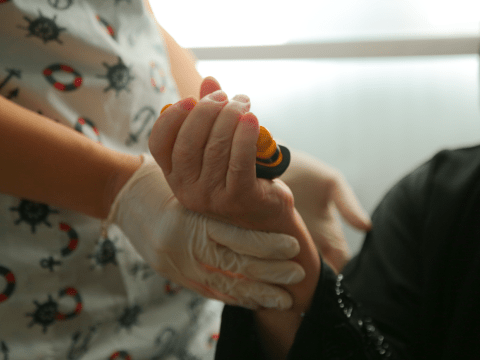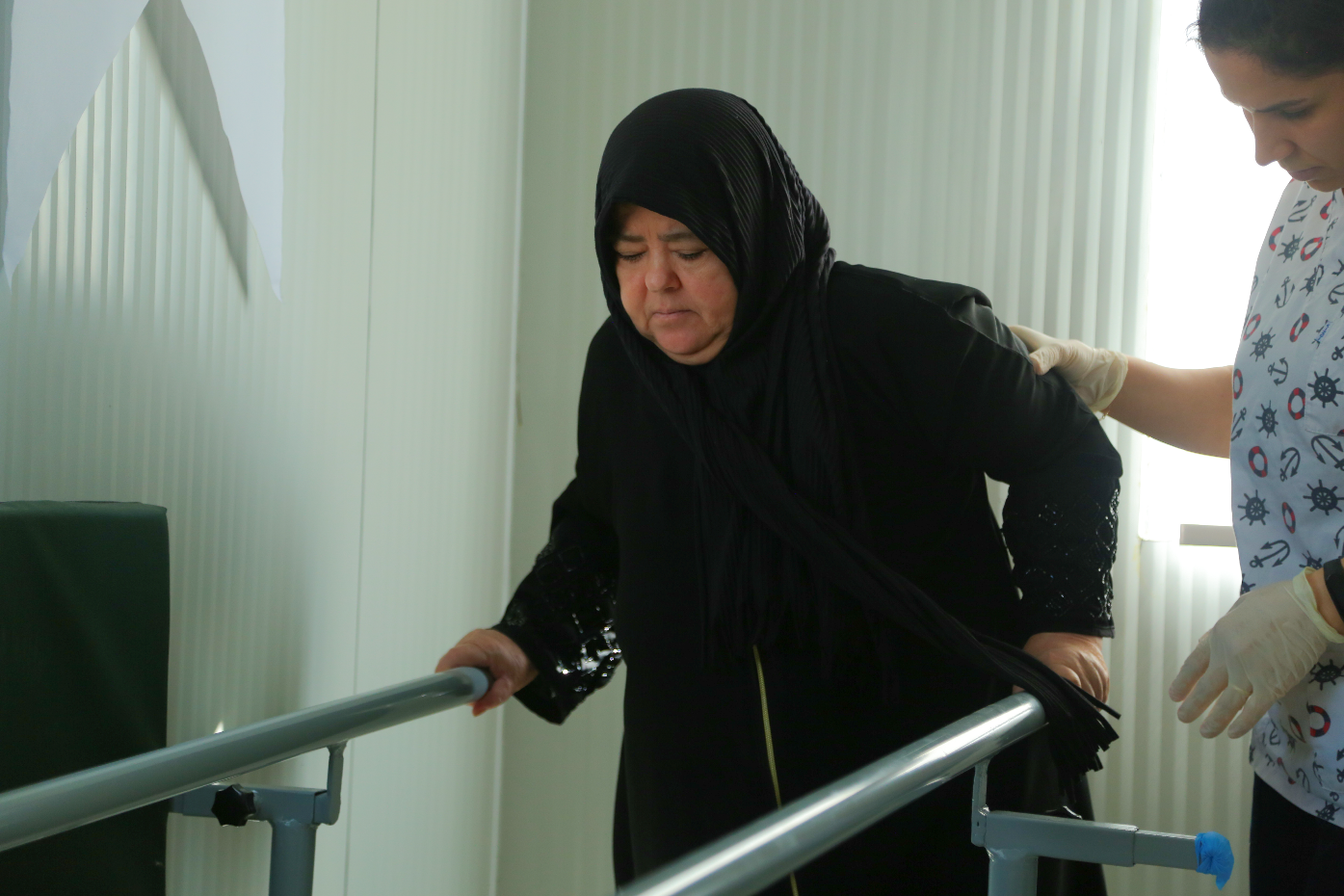Unstoppable train: life amidst disability and conflict

“We found a place when we arrived [to Türkiye]. But we spent some time dealing with fear and memories of the shelling,” Safiye*.
Life can be ruthless, refusing to take a second glance at whoever falls behind. It does not acknowledge bodies weathered by mountains of trauma nor torment scarring human bodies. The sun will rise tomorrow signaling a new beginning for millions of people.
For some people like Safiye* the train of life almost ran her over while trying to catch up. Meanwhile, clouds of shelling and streams of bullets echoed threat across her village, life was forcibly making its way.
Safiye got married in her forties, she’s in her early fifties now. “It’s just me and my 80-year-old husband, we don’t have children- he was previously married and has children,” she states. She had established a peaceful life while the conflict was raging right outside her doorstep. This is the reality for 12 million people. “We were living in Idlib when the bombings and shelling began. We tried staying, but the shelling was intense. We saw many people die and houses destroyed,” she recalls.
These scenes are engraved in Safiye’s mind. At times, they tried escaping by displaying themselves as haunting flashbacks. While all of this was happening, life was happening too and it dictated their immediate departure to Türkiye.
Perhaps life would be something else there. Who knows, Safiye thought.
As a result, the couple left their home after the holy month of Ramadan ended in 2012. This meant while the world prepares for Eid, the couple began thinking of a way to escape the horrors turning the page on the smell of bombs, destroyed and evicted homes and sorrows. Thankfully, they could secure a home and life went on- or that’s what they thought.
Life had another challenge for Safiye- not taking into consideration her high blood pressure and diabetes. The Türkiye earthquake struck, shocking everyone to their core. “We stayed in the car for two or three days but we had to sleep inside the home, we had nowhere to go,” she shares. And just like that, time passed until the couple felt safe enough to go back into their home-there was no severe damage to their home.
Unbeknownst to Safiye, her body was recording traumas waiting for the moment to unveil themselves to the world.
Safiye thought leaving the fighting in her country, things would get better on their own. But inside her body, there was a cold war eating away at her organs. Her health situation was already in a fragile state, to begin with. “I had three surgeries on my leg. One for a joint, a half joint, and one for calcification. The joint surgery was twenty years ago back in Syria, but the calcification was done at the university hospital after we arrived in Türkiye. The first surgery wasn’t successful; I couldn’t walk for a year. The second surgery was better, and I started walking again,” she recalls the days when she gained her ability to walk again.
Until her body had its last straw and began protesting against her.
Body Vs. Memories
“My husband and I were at home on the twentieth day of Ramadan in 2023- Ramadan during that year less than a month after the earthquake struck-, I was fine. Suddenly, I felt like my blood pressure had risen while I was asleep. Regardless of the pain, we had our suhoor- food that people who fast eat to prepare their bodies for the day until the sun rises, then they can eat again- and prayed,” she remembers. However, this feeling was a warning sign, Safiye’s body was finally speaking up and trauma was being translated into felt reality.
“The scenes of destruction and death are still vivid in our minds, but over time, we started to adapt, accept that we are refugees, and tried to move on with our lives,”
“That same morning, I tried to get up but couldn’t sit or move myself or my right side, the same leg where I had the surgeries,” she says. During that time, Safiye had no control over her body, in fact, it showed her the wrath of the past years. Her body was at the crossfire while people rushed to help her finally calling her brother who in turn brought their car. “After being admitted, I realised I became paralysed and I am unable to move on my own,” she adds.
Safiye felt helpless, it was her body and she had no control over it, “it was a brain haemorrhage and 20 days later I was discharged,”. Safiye’s world as she knows it was turned upside down, “I was in a wheelchair and could not walk at all, but I heard about a physical therapy centre that could help me,” she remained hopeful.
To Be or Not to Be? Are We Both?
The physical centre was a light in the middle of a dark tunnel. “I had 14 physiotherapy sessions so far. During the first three, I used my wheelchair, I couldn’t walk but now, I’m using a walker and exercising. The therapist gave me weights to strengthen my arm and leg. I’m better than before,” she shares.
The World Vision Syria Response- funded centre provides physical rehabilitation and therapy sessions for more than 1,281 people along with support with assistive devices when needed. So far 20 people benefitted from the assistive devices. Also, 250 people enrolled in the psychosocial support sessions which provide a special focus on people with disabilities. Moreover, the project aims to increase people’s awareness regarding common psychological illnesses and diminish the stigma surrounding them. In the health centre, people suffering from post-traumatic disorder, and anxiety depression are shown a path to understanding this illness and are enrolled in educational sessions such as stress management, mindfulness and relation techniques. This integrated approach aims to equip participants with tools to navigate their emotions.

World Vision Syria Response Partner, Independent Doctors Association.
Safiye never let go of her dream of walking again and in return, it held on to her. With time passing, she began noticing her body getting stronger and experiencing positive results. “Transitioning from not being able to move without help, and now using a walker, I can move by myself. Initially, I needed someone to help me get up and reach the walker, but now, I’m much better with physical therapy. I still have some heaviness and difficulty moving my arm and leg, but it’s much better. The therapist applies cold water to my leg, and we do exercises to move my leg up and down. I feel fifty per cent better,” she proudly shares her improvement.

World Vision Syria Response Partner, Independent Doctors Association.
Safiye is the picture-perfect example that determination and strive will be reflected in daily life. Her belief that she will walk one day helped her clench onto life.
*Name has been changed to protect identity.